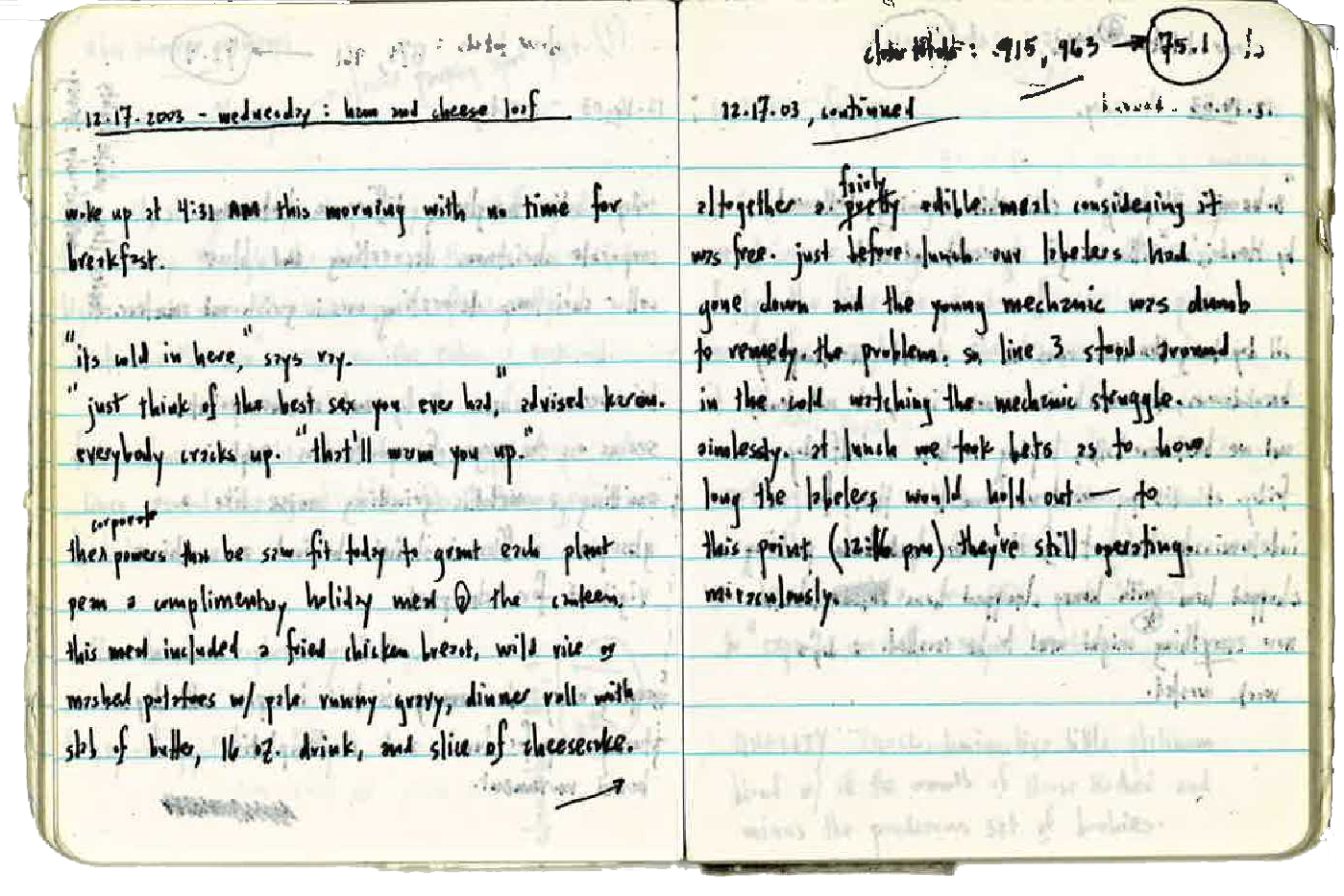HANDWRITTEN: There were a couple mentions of politics in this first diary. On one page, you wrote: “Young republicans is a fraternity for rich, ugly white guys.”
BUTLER: Oh, where’s that?
HANDWRITTEN: It was in the undated parts.
BUTLER: (Laughs)
HANDWRITTEN: That’s the only text on that page.
BUTLER: (Laughs)
HANDWRITTEN: (Laughs)
BUTLER: (Laughs)
HANDWRITTEN: (Laughs)
BUTLER: Oh man, I just saw something in there also about by Che Guevara shirt, which I remember wearing that in from time to time.
HANDWRITTEN: I think you have six more pages to go.
BUTLER: Oh, so Che Guevara comes after the Young Republicans?
HANDWRITTEN: No, before.
BUTLER: Oh, ok. Now I gotta find this thing. (Laughs.) Yeah, there it is. Yeah, (laughs). I don’t know, what are you going to say? It’s funny, I mean the first thing that pops into my head is these pictures that were coming out during the election cycle, like Paul Ryan with the Congressional Aides behind him. You know what I’m talking about? And there was not a brown or black face anywhere behind him.
HANDWRITTEN: It was a total white out.
BUTLER: It was just a white out. (Laughs.) Yeah, I don’t know. It was. It was a weird political environment to work in. You were so, I was a union member. If you were working there as a meat packer, you were a member of the United Food and Commercial Workers, and I can’t remember what our post was, 538 I think it was.
Union Politics was always swirling around, not just because our plant could get shut down or we could laid off but because we were talking about other plants in other parts of Wisconsin, which have subsequently shut down. So there was this kind of awakening, well for some people, you experienced an awakening, like wow, this is what a union is for. Thank God I am in a union. I feel a kinship with these other union members. And there were many others who resented paying union dues who didn’t understand what a union did, and I remember many conversations about people talking about buying everything they consumed from Walmart, and some of us saying well, maybe that’s not the most pro-union way to move about your life and stuff like that, and also just feeling like well nobody has any money. How can I rightly tell somebody to go shop at the co-op and pay 50% or 75% more because it’s the so-called right thing to do?
Politics was always right there at the surface. Plus, it was the early years of the Bush Administration, and those were pretty dark days. 9-11 had only happened two years before.
HANDWRITTEN: Did it ever surface though? You had the gossip, the Green Bay Packers, but did politics ever emerge as itself? Or just as corporate politics, hierarchies, The Man, etc?
BUTLER: That’s a good question. In terms of National State Politics, I don’t remember that coming up a whole lot. I’m trying to think. Yeah, I don’t remember conversations about that.
I remember clear as day one conversation. It was in the morning. I was in the locker room and there was this guy who had gotten hired about the same time as me — his name was Mike — and he was a coupe lockers down from me. He was not a super bright guy, nice enough, but he mentioned something about how we were paying more in dues because there was a plant east of us that I think was run by Hormell, I think, and they were on strike. We were paying a little bit more to help support those workers. I think this is right. And he said something like, "I don’t understand why we’re paying these dues, I don’t like paying dues in the first place." And there was another guy who had been working in the plant much longer than us who overheard him, and basically checked him. He said, “These are our union brothers and sisters, and we’ve gotta support them through this. That could be us.”
I can remember, even in that moment, thinking that Mike didn’t get it at all, even though somebody had explained it to him, in not even a confrontational way. He just was not willing to think about it that way. That was the most politics got out there, vocally. We were always kind of making fun of corporate or watching the corporate people go in their corporate entrance to the plant, you know, dressed in nice clothes. We’d be schlepping out at the end of the day covered in lunch meat. It was kind of like walking by first class on your way to coach in an airplane, you know? All the politics happening in those days were happening in the meat plant, too.
HANDWRITTEN: Right, a microcosm. That speaks to what you were saying earlier. You all support each other and that unionship, brothership, also going through the same experiences, where maybe the personal politics didn’t matter in the day-to-day as you’re so focused on survival. Like you had to focus on the stuff that was going on in front of you.
BUTLER: Yeah. What else was I going to say about that? Shit, I forgot. Sorry.
































































